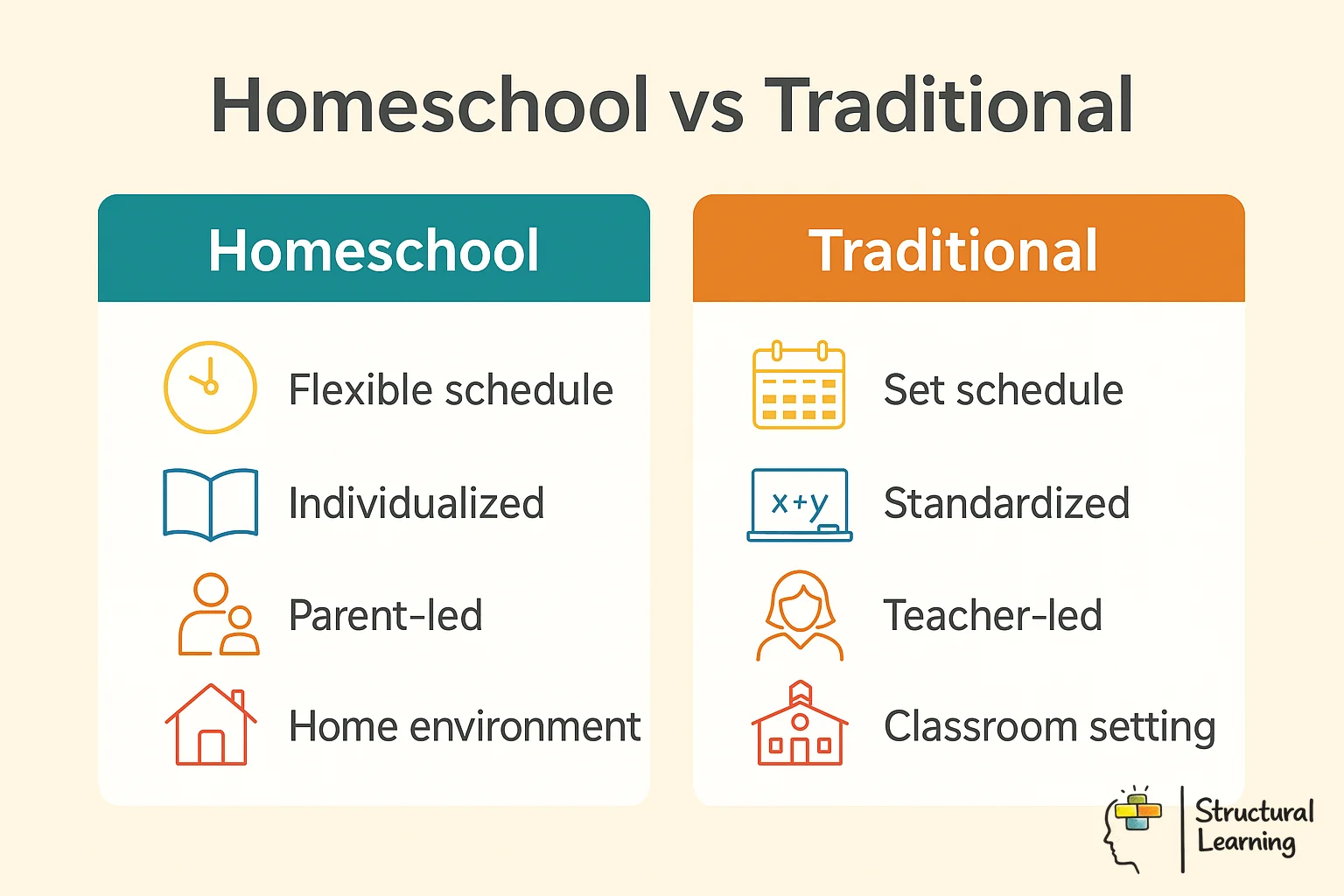Homeschooling
Explore homeschooling benefits: personalized learning, flexible schedules, emotional security, and tech integration for effective child education.


Explore homeschooling benefits: personalized learning, flexible schedules, emotional security, and tech integration for effective child education.
Homeschooling is a flexible, parent-guided homeschool program in which families choose to educate their children at home rather than enroling them in public schools or charter schools. Sometimes referred to as home education or elective home education, this approach helps parents to design AI-enabled personalised learning plans that reflect a child's unique interests, strengths, and developmental needs.

When thoughtfully planned and carried out in line with regulations, homeschooling in 2025 can provide a rich, adaptable learning environment that nurtures academic growth and life skills alike.
Key Points:
Successful homeschooling requires careful planning and organisation to ensure comprehensive educational outcomes. When developing your homeschool programme, begin by researching your local requirements and creating a structured approach that balances academic rigour with flexibility.
Start by establishing clear learning objectives for each subject area, incorporating both mandatory curriculum requirements and your child's personal interests. Consider using a combination of traditional textbooks, online resources, and experiential learning opportunities to create a well-rounded educational experience. Many families find success with unit studies that integrate multiple subjects around central themes, allowing for deeper exploration whilst meeting various academic standards.
Regular assessment and documentation are crucial components of effective homeschooling. Keep detailed records of your child's progress, including examples of work, test results, and developmental milestones. This documentation not only helps track educational growth but also ensures compliance with local regulations and can be valuable for future educational transitions.
One of the most valuable aspects of modern homeschooling is the extensive network of support available to families. Local homeschool groups provide opportunities for peer learning, group activities, and shared resources, whilst also offering parents the chance to connect with others on similar educational journeys.
Many communities offer homeschool co-operatives where families share teaching responsibilities, allowing parents to focus on their areas of expertise whilst their children benefit from diverse instruction. These arrangements can be particularly beneficial for subjects requiring specialised knowledge or equipment, such as advanced sciences or foreign languages.
Online communities and forums provide additional support, offering curriculum advice, troubleshooting assistance, and emotional support during challenging periods. These digital networks often include experienced homeschooling families who can provide practical guidance on everything from daily scheduling to preparing for standardised assessments.
Homeschooling in 2025 represents a mature and well-supported educational option that continues to evolve with technological advances and growing community resources. When approached thoughtfully and systematically, it offers families the opportunity to create personalised learning experiences that can rival or exceed traditional educational outcomes.
The key to successful homeschooling lies in balancing flexibility with structure, ensuring compliance with local regulations whilst maintaining the freedom to adapt to your child's unique learning needs. By using available resources, building strong support networks, and maintaining detailed records of progress, families can create enriching educational environments that prepare children for future academic and personal success.
As the homeschooling community continues to grow and mature, the wealth of available resources, support systems, and proven methodologies makes this educational approach more accessible and effective than ever before. Whether motivated by educational philosophy, practical considerations, or specific learning needs, families choosing homeschooling can feel confident in their ability to provide quality education that prepares their children for lifelong learning and success.
For those interested in exploring homeschooling research and methodologies further, the following academic sources provide valuable insights:
Homeschooling is a flexible, parent-guided homeschool program in which families choose to educate their children at home rather than enroling them in public schools or charter schools. Sometimes referred to as home education or elective home education, this approach helps parents to design AI-enabled personalised learning plans that reflect a child's unique interests, strengths, and developmental needs.

When thoughtfully planned and carried out in line with regulations, homeschooling in 2025 can provide a rich, adaptable learning environment that nurtures academic growth and life skills alike.
Key Points:
Successful homeschooling requires careful planning and organisation to ensure comprehensive educational outcomes. When developing your homeschool programme, begin by researching your local requirements and creating a structured approach that balances academic rigour with flexibility.
Start by establishing clear learning objectives for each subject area, incorporating both mandatory curriculum requirements and your child's personal interests. Consider using a combination of traditional textbooks, online resources, and experiential learning opportunities to create a well-rounded educational experience. Many families find success with unit studies that integrate multiple subjects around central themes, allowing for deeper exploration whilst meeting various academic standards.
Regular assessment and documentation are crucial components of effective homeschooling. Keep detailed records of your child's progress, including examples of work, test results, and developmental milestones. This documentation not only helps track educational growth but also ensures compliance with local regulations and can be valuable for future educational transitions.
One of the most valuable aspects of modern homeschooling is the extensive network of support available to families. Local homeschool groups provide opportunities for peer learning, group activities, and shared resources, whilst also offering parents the chance to connect with others on similar educational journeys.
Many communities offer homeschool co-operatives where families share teaching responsibilities, allowing parents to focus on their areas of expertise whilst their children benefit from diverse instruction. These arrangements can be particularly beneficial for subjects requiring specialised knowledge or equipment, such as advanced sciences or foreign languages.
Online communities and forums provide additional support, offering curriculum advice, troubleshooting assistance, and emotional support during challenging periods. These digital networks often include experienced homeschooling families who can provide practical guidance on everything from daily scheduling to preparing for standardised assessments.
Homeschooling in 2025 represents a mature and well-supported educational option that continues to evolve with technological advances and growing community resources. When approached thoughtfully and systematically, it offers families the opportunity to create personalised learning experiences that can rival or exceed traditional educational outcomes.
The key to successful homeschooling lies in balancing flexibility with structure, ensuring compliance with local regulations whilst maintaining the freedom to adapt to your child's unique learning needs. By using available resources, building strong support networks, and maintaining detailed records of progress, families can create enriching educational environments that prepare children for future academic and personal success.
As the homeschooling community continues to grow and mature, the wealth of available resources, support systems, and proven methodologies makes this educational approach more accessible and effective than ever before. Whether motivated by educational philosophy, practical considerations, or specific learning needs, families choosing homeschooling can feel confident in their ability to provide quality education that prepares their children for lifelong learning and success.
For those interested in exploring homeschooling research and methodologies further, the following academic sources provide valuable insights:
{"@context":"https://schema.org","@graph":[{"@type":"Article","@id":"https://www.structural-learning.com/post/homeschooling#article","headline":"Homeschooling","description":"Explore homeschooling benefits: personalized learning, flexible schedules, emotional security, and tech integration for effective child education.","datePublished":"2023-12-12T11:07:30.610Z","dateModified":"2026-01-26T10:09:32.212Z","author":{"@type":"Person","name":"Paul Main","url":"https://www.structural-learning.com/team/paulmain","jobTitle":"Founder & Educational Consultant"},"publisher":{"@type":"Organization","name":"Structural Learning","url":"https://www.structural-learning.com","logo":{"@type":"ImageObject","url":"https://cdn.prod.website-files.com/5b69a01ba2e409e5d5e055c6/6040bf0426cb415ba2fc7882_newlogoblue.svg"}},"mainEntityOfPage":{"@type":"WebPage","@id":"https://www.structural-learning.com/post/homeschooling"},"image":"https://cdn.prod.website-files.com/5b69a01ba2e409501de055d1/696a31818fa52d584f70bbda_696a31808fa52d584f70bb63_homeschooling-infographic.webp","wordCount":5073},{"@type":"BreadcrumbList","@id":"https://www.structural-learning.com/post/homeschooling#breadcrumb","itemListElement":[{"@type":"ListItem","position":1,"name":"Home","item":"https://www.structural-learning.com/"},{"@type":"ListItem","position":2,"name":"Blog","item":"https://www.structural-learning.com/blog"},{"@type":"ListItem","position":3,"name":"Homeschooling","item":"https://www.structural-learning.com/post/homeschooling"}]}]}